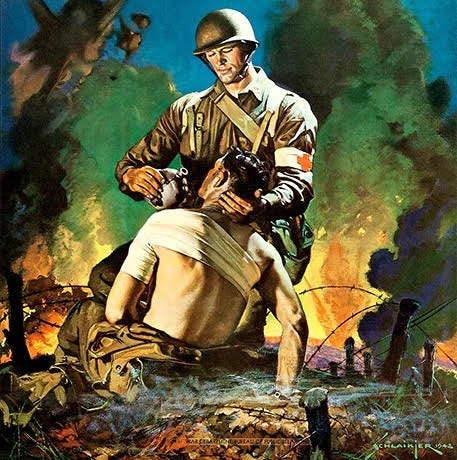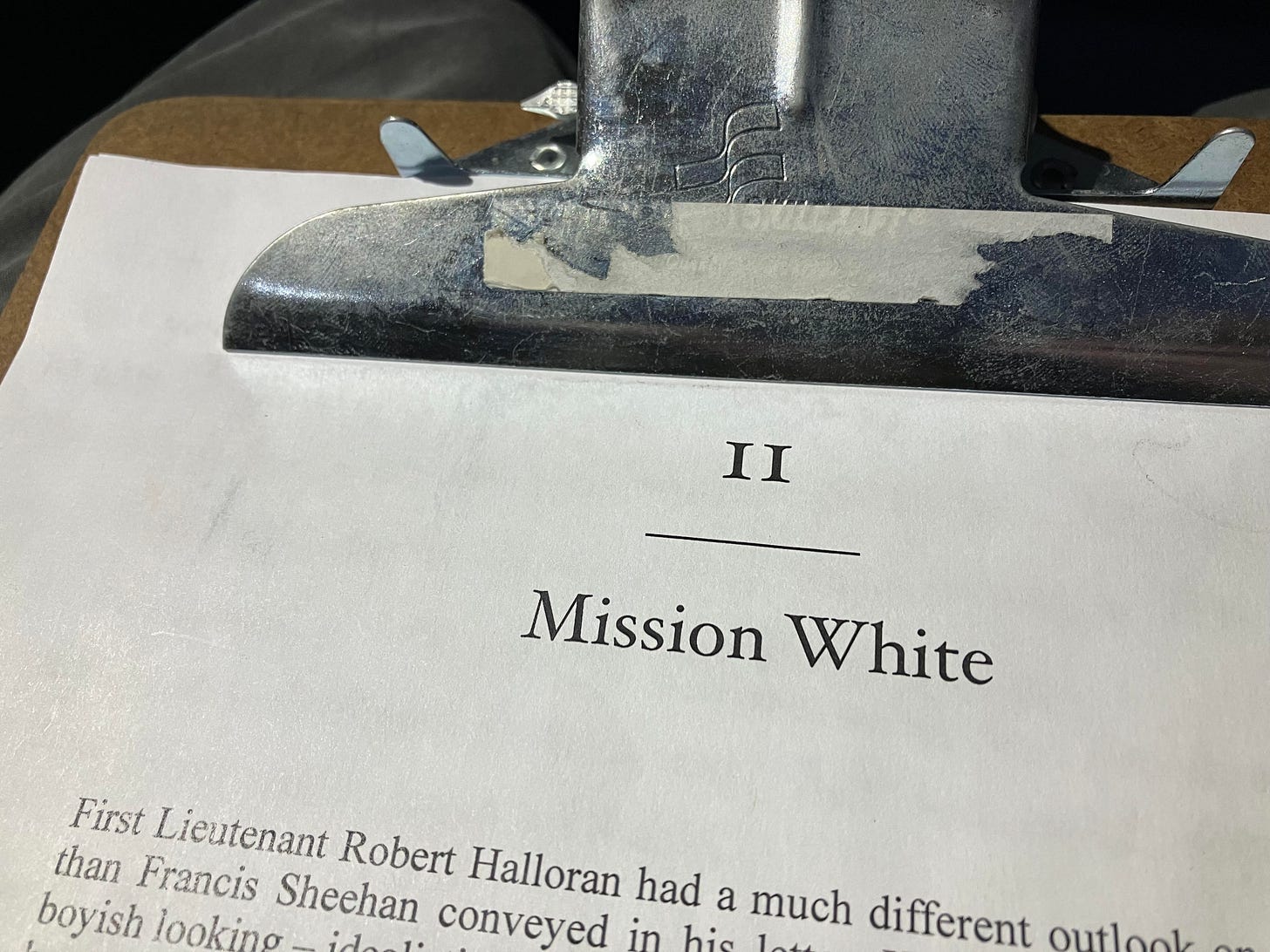Welcome to Ridgway’s Notebook, where we offer penetrating essays on military history. Told through the World War II experiences of General Matthew Ridgway and the 82nd Airborne Division, we illustrate some of the similarities between the questions asked by officers of the 82nd yesterday and today—and dissect how they came to be.
The faces of Robert Halloran and William Kitchin were inscribed with the firebrand trials of war. Though his boyish streak was still betrayed by jovial grin, Halloran’s youthful face had aged starkly, his eyes sunken, the dancing glint in them gone. They appeared as though aged in a pressure cooker. Kitchin’s complexion turned dark, his chin drawn square, his features weathered and chiseled through hard living. They were in striking contrast to their former selves. They looked old. Their youthfulness was tainted. Shadows were in their eyes.
— Excerpt from Battle Surgeons
Captain William Walton Kitchin being hunted in the dark like a game animal was almost an accident. A doctor parachuting into enemy territory, like Kitchin had on Sicily, was a product of bureaucratic meddling the likes of which are resented by kings of Army fiefdoms. A Medical Corps officer at the Army’s General Headquarters acquired an Infantry Board memorandum which relegated medics to the base echelon so they could “create the feeling among parachutists that some special effort was to be made [on] their behalf”—although there really wasn’t.
The Medical Corps officer inquired of the Chief of Infantry. The long arm of General Headquarters reached down. By August, 1941, there were two doctor-parachutists. The jumping medical section was born.
The pages of Battle Surgeons are inscribed with the deeds of one such detachment. Set within the epic of European airborne missions, Battle Surgeons memorializes 371 days of front-line duty worked by medics of the 504th Parachute Infantry Regiment. It animates their band—the stalwart surgeons, their happy-go-lucky chaplain, and the youthful dentist—as they navigate World War II.
Up the gray peaks of Italy they trod, where Captain Sheehan was shot; and in the marshlands of Anzio, where Captain Sheek withstood the worst malaria could throw; and the Dutch lowlands, where Captain Shapiro crossed broad rivers; and through Belgium’s frozen forests, where Captain Halloran lamented the injury of a friend; through all this and more the doctors were in it, at places whose names echo through history: San Pietro, Anzio, Nijmegen.
In the wake of Sicily, the book’s sub-plot opens. Casualties were a struggle to evacuate and clear due to deficiencies in equipment, organization, and training. It ignited a series of reforms within the 82nd Airborne Division which the book picks up again during the English interlude. They reach their high water mark in Operation Market Garden, made famous by A Bridge Too Far. Grizzled with experience, casualty care in the 82nd was at its most efficient.
Battle Surgeons offers a penetrating look at the airborne medical service, and provides a touchstone for the big impact of a small detachment.
Stay tuned for more information!
Housekeeping
Time is the most austere form of measurement, unforgiving and zero-sum. Ridgway’s Notebook has been happily consuming (lots of) time these past few months. But because of father time’s zero-sum nature, it’s consumed the time of other projects, including bringing two years of work to its culmination point—Battle Surgeons. As I sprint the final 100m to get Battle Surgeons to your hands, things may be a little quieter here for the next couple weeks.
But fear not, I have some good stuff planned for future essays, including ones that return to our roots in analyzing airborne division operations for your PME portfolio. I’m beginning the research for what I hope will be a biography of General Joe Swing. I envision serializing it here on RN. (Had I any actual talent, it would be a historical novel centered on the great general.) Also look for some analysis on the 82nd’s defense of the Market Garden lodgment, and “A Soldier’s Guide to Battle Surgeons.”
If you’re addicted to your fix of RN, during the slow period, shots of airborne history can be had on the revamped masthead of the web version, serving as our humble archive.
📚READ OF THE WEEK📚
The end of decisive battle? Or just a return to normalcy in the conduct of war?
Perhaps, we have been living in an anomaly. And now the anti-weapon to western/US technological overmatch has finally been found and tested, ushering back the baseline—attrition. All hail (some of) the old ways of war.
A thought-provoking article:









Tyler, your plans and projects sound most interesting. Also penning down your analysis on the 82nd's defence of the Market Garden lodgement. I also addressed that in our twin volumes on the 82nd in the Holland campaign and concluded the 82nd came out as a winner. I found out many details were yet undiscovered by previous historians, details that help understand the failure of reaching Arnhem in time.
Great read once again. Looking forward to Battle Surgeons.